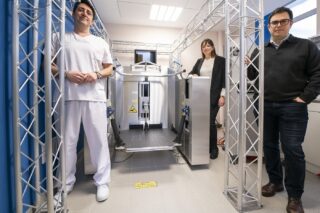The Medica Medicine + Sports Conference highlights how big data and AI are transforming the world of sports medicine. Innovation in digital sports technology is helping athletes push boundaries.
In the ultra-competitive world of sport, champions are distinguished from also-rans by mere thousandths of a second or fractions of a millimeter. The goal of every professional athlete or sportsperson in their prime is to be at the peak of fitness and self-discipline for the chance to be named the best. But how, when the difference between winning and losing is so slight, can they outperform the chasing pack?
For a growing number of sportspeople, cutting edge technology is one way of gaining an edge. In today’s digital age, the combination of advanced analytics and the increasing sophistication of data-gathering systems is transforming the way sports professionals play, coach, train, recruit and recover from injury. This technology, in turn, is filtering down to the amateur sports market.
Smart Sensors
Data has long played an instrumental role in the development of sports and sportspeople. Metrics that were once recorded with a pen and paper are now aggregated and processed by sensors, wearables and increasingly smart software. Driven by big data, these technologies provide the most intricate details about sporting performance, enabling athletes to fine tune their training regimes. By monitoring levels of strain and exertion, they can also help to prevent injury. Tim Clark, founder and President of San Francisco-based Scribe Labs, said:
“In terms of performance enhancement, the sports technology market is now transitioning from a laboratory or clinic-based model to one where wearable technology is enabling far more interaction with the athlete at a remote level.”
Scribe Labs’ Runscribe is an advanced wearable that captures 3D running metrics, allowing athletes to track and analyze their running mechanics. The RunScribe system comprises two, shoe-worn “footpods” which pair with an iOS or Android app. It allows users to identify biomechanical problems such as imbalances, and to determine how their running changes with cadence or different footwear.

The MVN Analyze system from Dutch company Xsens also relies on wearable sensors, with 17 IMU trackers placed on the athlete’s body (an IMU is a self-contained system that measures linear and angular motion with gyroscopes and accelerometers). The English Institute of Sport recently used the system to prepare biomechanical data for the 2018 Winter Olympics. Xsens Product Manager Peter Hartman explained:
“These tiny motion trackers capture everything from the smallest twitches to full-scale dynamic movement. The MVN Analyze biomechanical model and sensor fusion algorithms then process the data to ensure the highest quality motion analysis, even in challenging magnetically disturbed environments.”
Advanced analytics
Sports analytics is one of the most rapidly developing areas of sports technology, with the value of the market forecast to reach a staggering $4.7 billion by 2021. The evolution of artificial intelligence (AI) technology is one of the factors driving this growth, as there is simply no way for humans to identify patterns as quickly or as accurately as machines in the huge volumes of data being generated.

Integrated with artificial intelligence and virtual assistants, sports sensors can now process the data they collect in real-time, providing athletes of all levels with instant information and tips about their health and training routines.
Run Free Pro BIO, for example, are the world’s first AI earphones with gait analysis. Developed by California-based SOUL Electronics, they monitor running form and provide real-time voice coaching. Washington State-based Sensoria offers a range of AI sportswear, including a smart sock V2.0, which detects a runner’s crucial core metrics, including cadence, foot landing and impact forces. With data streamed to an iOS app in real time, an AI-empowered coach called Mara provides advice on how to run further, faster and healthier.











